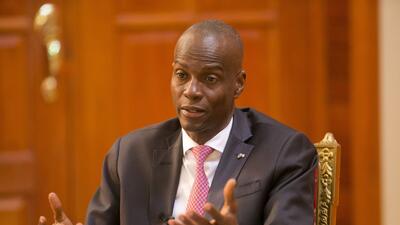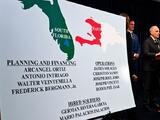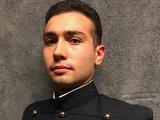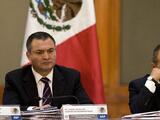More suspects in assassination of Haitian President Moïse transferred to U.S.

Four key suspects in the assassination of Haiti’s president, Jovenel Moise, were flown to Miami on Tuesday, to face federal conspiracy charges in connection with his murder in his bedroom in 2021, the U.S. Justice Department announced.
The four suspects – one Colombian former soldier and three Haitian-Americans – were removed from their cells on Monday night and put on a plane to Miami on Tuesday morning, according to family members and a lawyer for one of the accused.
Among those transferred to Miami was Germán Rivera, a retired Colombian army captain, who is alleged to have recruited the team of 20 Colombian soldiers who are accused of carrying out the fatal attack on Moise’s house in the early hours of July 7, 2021.
The other three are Christian Sanon, an ambitious Haitian-born pastor who was seeking to replace Moïse as president, Joseph Vincent, a former DEA informant and James Solages, a former security guard.
Rivera's family told Univision that they were taken totally by surprise by the news. "It was totally clandestine. They never told us or his lawyer. We don't know what's going on," said one family member contacted by telephone in Colombia who asked not to be named.
Regina de Moraes, the lawyer for Vincent, said she was happy with the news and said her client had been seeking to come to Miami for months.
"We look forward to seeing the charges but we are glad he is in this country at last," she said, noting that jail conditions in Haiti are among the worst in the world.
A criminal complaint charged Solages, 37, Vincent, 57, and Rivera, 44, with "conspiring to commit murder or kidnapping outside the United States and providing material support and resources resulting in death."
Sanon was in another house several miles away when the attack happened.
Sanon, 54, was not charged in the murder conspiracy but was instead charged with a lesser crime of conspiring to smuggle goods from the United States without a proper export license. This appeared to be related to some bullet proof vests used in the attack on the house.
It is not known under what conditions they were brought to the United States, if they surrendered voluntarily or were extradited against their will.
Solages, Vincent, Rivera, and Sanon are scheduled to make their initial federal court appearances on Wednesday.
US investigation into Moise murder strengthened by arrival of of latest suspects
Their arrival in Miami appears to strengthen the U.S. investigation into the assassination, coming on top of three other defendants who were brought to Miami last year and have already been charged with conspiracy to “provide material support” in kidnapping and murder, which carries a potential life sentence.
The three are Mario Palacios, one of the Colombian soldiers allegedly involved in the assassiantion, Rodolph Jaar, a former convicted drug trafficker and John Joel Joseph, a former Haitian senator. Their trial is scheduled for March 24, although that could now be delayed by the arrival of the four extra suspects.
U.S. prosecutors say the Colombian soldiers were originally hired by a Miami security firm, CTU, as bodyguards for Sanon, although the plot later allegedly evolved into a kidnapping and murder.
However, the latest accusations against the four new suspects to the case in Miami still leaves a mystery hanging over who were the masterminds behind the assassination.
"The U.S. investigation is very centered on the Miami nexus. But that is not the whole story of what happened," said Jake Johnston, a Haiti expert with the Center for Economic and Policy Research in Washington, D.C.. "They haven't identified who was behind it. Who was ultimately responsible for the murder of the president?" he asked.
The complaint alleges that in May 2021, Sanon contracted for equipment needed to support his “private military” force of 20 Colombians. Rivera led the Colombian group, according to the allegations.
It is alleged that Sanon conspired with others to ship 20 ballistic vests for use by the Colombians from South Florida to Haiti on June 10, 2021. The vests were shipped without the required export license from the U.S. Department of Commerce.
"CIA Operation"
An orginal plan to kidnap Moise and fly him out of the country failed.
A few days later, on July 6, 2021, Solages, Vincent, Rivera, allegedly met with others met at a house near Moïse’s residence, "where firearms and equipment were distributed and Solages announced that the mission was to kill President Moïse", the complaint stated.
In an afadavit by an FBI agent submited in court documents, "Solages falsely told those gathered that it was a 'CIA Operation,' and, in substance, said that the mission was to kill President Moise."
He added that Solages, Vincent and Rivera admitted to U.S. investigators that "prior to the assassination, everyone involved in the conspiracy understood that the plan was an assassination." The family of Rivera allege he was tortured into confessing.
The assassination of Moise has fueled political instability in Haiti which still has not appointed or elected a new president, in the midst of a brutal gang warfare in the capital.
Although 40 people have been arrested in Haiti, the investigation into the assassination has moved slowly after four judges were removed from the case. A detailed Haitian police investigation accused the Colombians of carrying out the assassination as part of a conspiracy involving several Haitian politicians, senior policemen and a Supreme Court judge.
The Colombians, and the three Haitian-Americans, have all vehemently protested their innocence.




